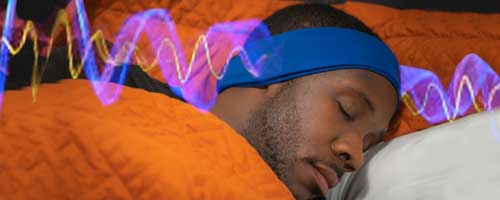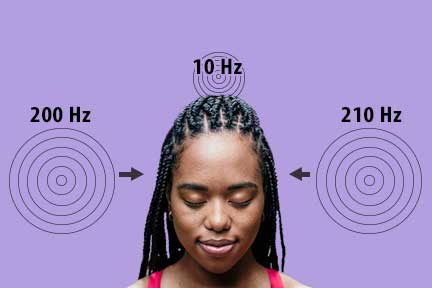Listening to Binaural Beats for Better Sleep
Listening to Binaural Beats While Sleeping
Whether you suffer from insomnia symptoms occasionally or on a regular basis, a lack of quality sleep can be frustrating and cause stress during your waking hours. If you have trouble sleeping, then you may have already done your research and tried things like meditation and sleep music to get a better night's sleep.
As relaxing as music for sleep and meditation can be, you might still have trouble dozing off and experience sleepless nights. If you're still struggling night after night, you should consider whether listening to binaural beats while sleeping could help you get better, more restful sleep. If you're just hearing about binaural beats for better sleep for the first time and want to know more, this article will help. By the end you'll know more about the benefits of listening to binaural beats while sleeping and about the best sleep headphones to help you listen and sleep comfortably.

man listenting to binaural beats for better sleep
What Are Binaural Beats?
Binaural beats are a form of sound wave therapy used to manipulate brain waves that have been studied for medical benefits since the early 1970s. Before that, the phenomenon was observed and studied in other fields like Physics and then later applied to functions of the brain. Described as a "self-help treatment" for better sleep, Medicalnewstoday.com states that binaural beats are "usually available in the form of audio recordings that a person listens to on headphones."
Entrainment
The path to the discovery of binaural beats began in 1665 with a Dutch scientist who observed and defined a process labeled "entrainment" in the context of Physics. He described it as "the tendency for two vibrating bodies to lock into phase so they vibrate in harmony" (De Wet, 96). Though others studied the concept and linked entrainment to activities in the brain, it wasn't until 1973 that an American biophysicist Gerald Oster asserted "that it could be possible to diagnose and address neurological problems using binaural beats/brainwave entrainment" (Padmanabhan).
Binaural Beats
When used to help improve the quality of your sleep, binaural beats are a sound experience created by your brain when two tones of different frequencies are played separately in each ear (Ryan). In response, your brain creates a third tone called a binaural beat at a frequency difference between the first and second tone.
An example of this is if you are listening to a sound at a frequency of 150 Hz in one ear and 142 Hz in the other. Your brain's response is to create a sound at 8 Hz, which is the difference between the two frequencies being played. Healthline.com states that binaural beats are "auditory illusions," that "for a binaural beat to work, the two tones have to have frequencies less than 1000 Hz, and the difference between the two tones can't be more than 30 Hz" (Cafasso). Within those frequency parameters, a binaural beat is created that can help improve conditions like insomnia.
How Do Binaural Beats Affect Your Brainwaves?
To encourage different responses in the brain, binaural beats are created at different frequencies to encourage brainwave activity. Brainwaves are broken up into five categories based on their frequency and which states of consciousness are related to their activity.
The five types of brainwaves as described by sleepfoundation.org and medicalnewstoday.com are:
Gamma waves – The frequency of delta waves ranges between 30 Hz and 50 Hz and are associated with wakefulness. Binaural beats played at gamma wave frequencies may improve alertness.
Beta waves – Beta wave frequencies range between 13Hz and 30Hz, and are associated with an active, alert mind. Binaural beats played at these beta wave frequencies can affect accuracy, memory, and mood.
Alpha waves – The frequency of alpha waves ranges between 8Hz and 13Hz and are associated with calm and states of light meditation. Medicalnewstoday.com writes that binaural beats played at alpha wave frequencies may increase relaxation.
Theta waves – Theta waves frequencies range between 4Hz and 8Hz and are said to be associated with the lightest stages of "sleep . . .drowsiness, and meditation" by sleepfoundation.org. Binaural beats played at theta wave frequencies may improve REM sleep and induce meditation.
Delta waves – The frequency of delta waves ranges between .05 Hz and 4 Hz and are associated with deeper stages of sleep. Binaural beats played at delta wave frequencies may improve sleep quality, duration, and sense of wellbeing. In studies, this activity is observed and recorded with an electroencephalogram (EEG) brain scan.
When you put on stereo headphones to listen to binaural beats in the delta or theta frequency, studies suggest that you are more likely to fall asleep faster and experience deep, restful sleep. Ideal conditions include a quiet, private space where you can listen uninterrupted for around thirty minutes per day.
Will Binaural Beats Help You Sleep?

depiction of how binaural beats involve two different frequencies carefully chosen to influence brainwaves
Current research suggests that when you listen to binaural beats music for sleep you can experience better sleep, though the results vary. According to Psychologytoday.com, "slower, lower frequency theta and delta waves dominate" during non-REM sleep and that "[slowing] brainwave activity" with binaural beats "[helps] to produce low-frequency waves, [and] is likely to aid relaxation and sleep." Other researchers agree that while further research is needed, binaural beats of the theta and delta wave frequencies encourage deep sleep, restfulness, and better quality of sleep overall (Ryan).
That's why SleepPhones® headphones are the ideal companion to binaural beats audio – because they allow you to comfortably lay in bed without headphones getting in the way of comfort. Why let a pair of headphones stand between you and night after night of improved, better-quality sleep?
The Best Way to Listen to Binaural Beats While Sleeping
Research shows that "the magnitude of the effect" of binaural beats "depends upon the frequency used, time under exposure" and other factors like sound quality (Garcia-Argibay). This means that the optimum binaural beats experience requires the right set of stereo headphones to create the third frequency.
One of the major problems that binaural beats listeners struggle with is how hard it is to find headphones that can be worn during sleep. It's not easy to wear traditional headphones in bed, especially if you sleep on your side or toss and turn, and some people are uncomfortable with earbuds in their ears.
Why try listening to binaural beats while sleeping if your headphones are just another distraction from getting a good night's sleep?
Binaural beats listeners are happy to know that this problem is solved thanks to SleepPhones® headphones - headphones for sleeping designed with comfort in mind. Available in wireless Bluetooth and cord versions in a variety of colors and fabrics, SleepPhones® headphones make it easier to comfortably customize your binaural beats experience.
SleepPhones® headphones are designed to sit over the ear, which makes them more comfortable than other headphones, even for side sleepers, and less likely to move while you sleep. The luxurious, soft headband is made of our exclusive SheepCloud fabrics with thin, padded removable speakers that make it easy to lay down and listen to binaural beats during sleep. Experienced binaural beats users agree that the best way to experience distraction-free binaural beats during sleep is with SleepPhones® headphones so you can get the rest you need.
Where to Find Binaural Beats Sleep Recordings
Now that you know the potential benefits of binaural beats, you might be interested in finding high-quality binaural beat audio recordings to check out so you can get better sleep. To try out AcousticSheep's catalog of free binaural beat MP3s visit www.SleepPhones.com or download the SleepPhones® iPhone app to access the free online catalog anytime. We've got a variety of tracks to choose from so one is sure to be a good fit for you.
Other resources for a variety of free binaural beats music for sleep can be found online. It's important to note, however, that many of the videos and sleep tracks you'll find were not designed by a medical or sleep professional. No matter what you choose, research results suggest that results will vary and that you may need to experiment with duration and various binaural beats tracks to find the one that works best for you.
Other Benefits of Binaural Beats
In a 2015 study published in Frontiers in Psychiatry, a review of the effects of binaural beat stimulation showed potential to modify brainwaves to improve a variety of conditions besides poor sleep. Besides the benefits of improved sleep, studies suggest that binaural beats may help with:
- Memory
- Mood
- Concentration
- Creativity
- Mindfulness
- Alertness
- Stress
- Anxiety
- Chronic pain
In all cases, experts suggest that results will vary from person to person and depend on frequency. To realize the benefits of binaural beats individuals must experiment with the amount of time that they listen to binaural beats, and which sounds work best for them. Binaural beats may not work for everyone, but in many cases offer relief and reprieve from conditions like stress, anxiety, and insomnia.
Do Binaural Beats Have Side Effects?
While there are currently few know side effects to listening to binaural beats, sleepfoundation.org states offers advice about the volume and decibels that are safe to listen to. They write that "long-term exposure to sound at 85 decibels or higher" like "motorcycles, concerts, sporting events, and listening to music at full volume through headphones" can do permanent damage to your hearing. This means that it's important not to listen to binaural beats too loudly through your SleepPhones® headphones to protect your hearing.
Whether you're interested in binaural beats for better sleep or one of the many other related health and wellness perks, the proven benefits of this type of sleep music await. Remember, to improve your binaural beats experience, make sure you're using the best sleep headphones for more restful, comfortable listening. So, the next time you can't sleep, grab your SleepPhones® headphones, get cozy, and try listening to binaural beats!
